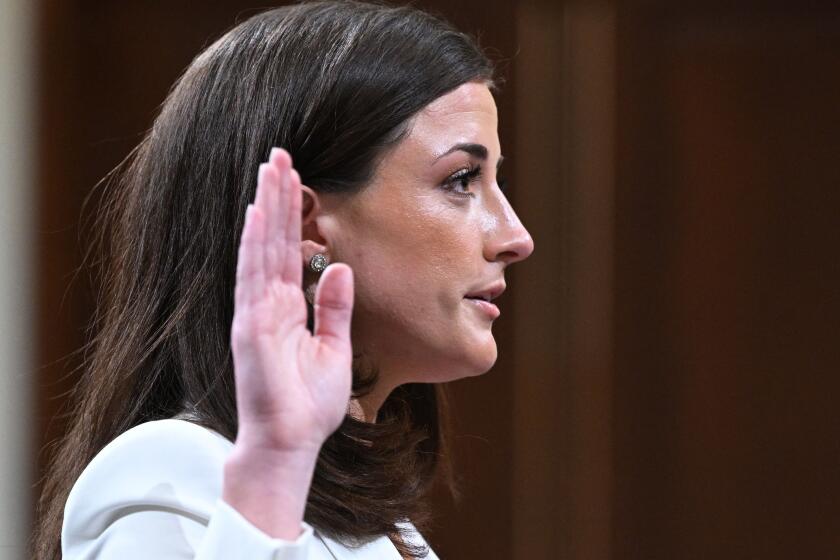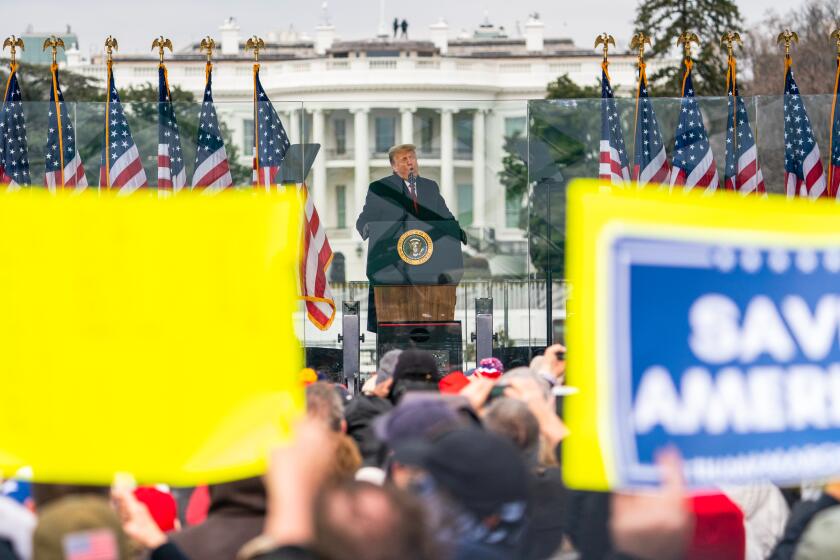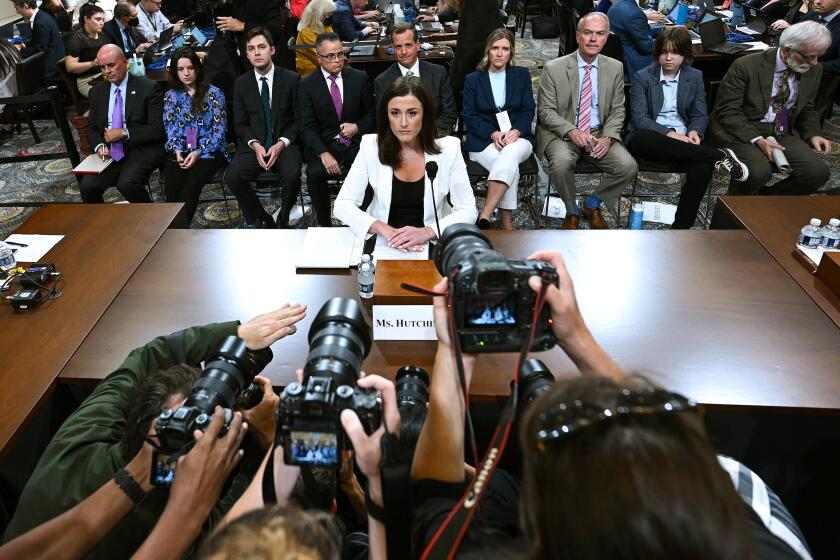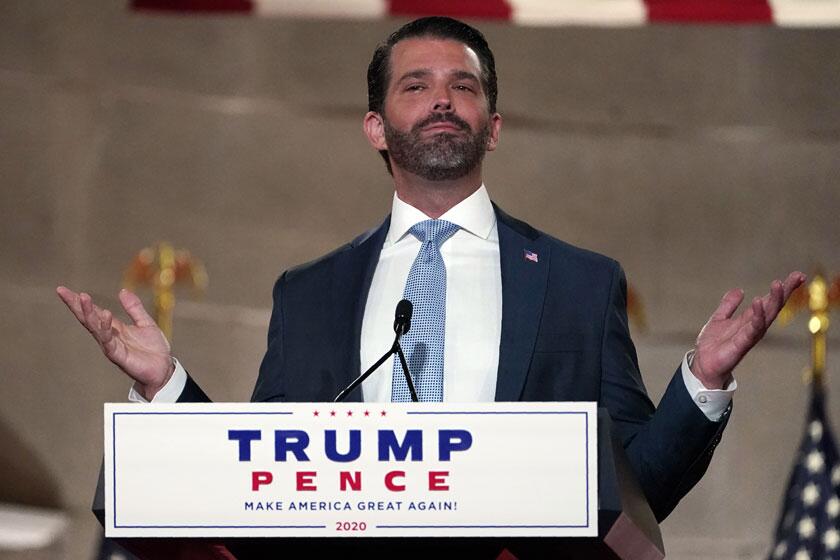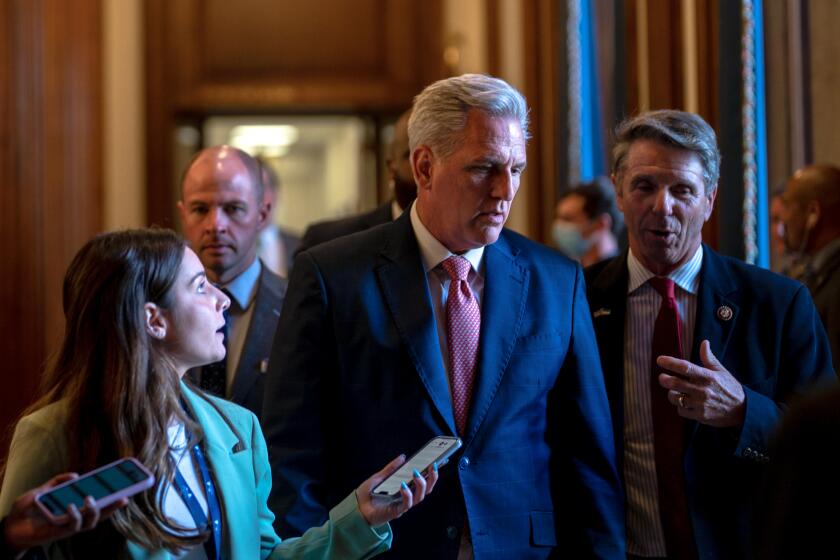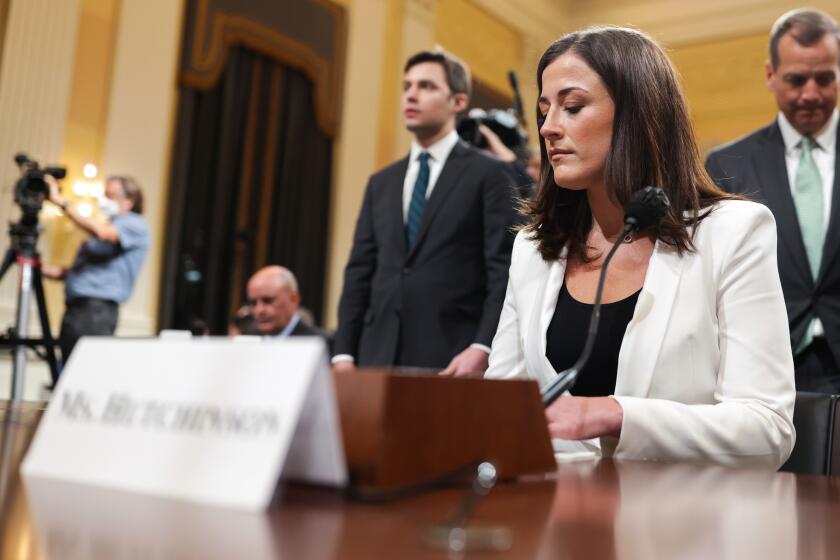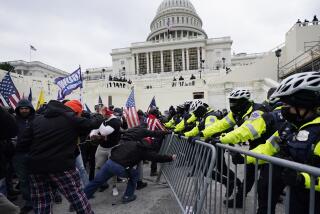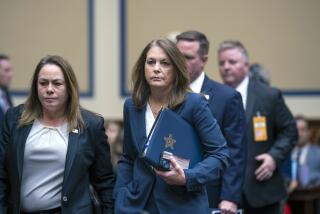Trump knew violence was planned and his supporters were armed on Jan. 6, ex-aide testifies

WASHINGTON — Then-President Trump and his chief of staff, Mark Meadows, were aware the Capitol was a target of violence and that Trump supporters were armed with weapons when the president urged them to march to the building on Jan. 6, 2021, a former aide testified in a bombshell hearing Tuesday that also revealed Trump repeatedly pushed to pardon those involved in the attack.
In a hearing abruptly called by the House panel investigating the Capitol insurrection, Meadows’ former aide Cassidy Hutchinson gave a detailed accounting that the Secret Service informed Meadows in advance that violence was possible Jan. 6, and that Trump expected to lead the crowd to the Capitol to pressure lawmakers to keep him in office — an act the White House counsel warned could be a crime.
Hutchinson also said that Trump’s aides pressured him into giving a speech the next day with threats that he could be removed from office under the 25th Amendment.
In addition, the committee suggested Tuesday that it has evidence that Trump’s supporters are attempting to tamper with witness testimony to the panel.
Tuesday’s testimony from Hutchinson was the most direct evidence provided by the committee that Trump and his inner circle knew of but disregarded the threats to the Capitol.
Hutchinson said she learned that Trump went so far as to grab the steering wheel of the presidential SUV and attack a Secret Service agent when he was told his security detail would not take him to the Capitol on Jan. 6.
Cassidy Hutchinson, White House aide, testifies about Trump’s anger on Jan. 6.
She added that Trump was furious that the audience at his speech near the White House wasn’t at capacity, even though he was told by the Secret Service that there was a large number of people outside the fence who had weapons and weren’t submitting to screenings by magnetometers, referred to as “mags.”
Hutchinson said Trump told the Secret Service, “I don’t effing care that they have weapons, they’re not here to hurt me. Take the effing mags away.”
After the speech, in which Trump told the crowd that he would be going with them to the Capitol, the Secret Service instead returned him to the White House because of the violence already underway at the Capitol. Trump became irate, Hutchinson said she was told by Anthony Ornato, Trump’s chief of operations. The head of Trump’s security detail, Secret Service agent Bobby Engel, who was traveling with the president, was in the room when the story was relayed, she said.
“The president reached up towards the front of the vehicle to grab at the steering wheel. Mr. Engel grabbed his arm, and said, ‘Sir, you need to take your hand off the steering wheel. We’re going back to the West Wing. We’re not going to the Capitol.’ Mr. Trump then used his free hand to lunge towards Bobby Engel,” Hutchinson said, adding that the agent gestured toward his clavicle to describe where the president lunged at him.
Trump denied the allegation in a post on his Truth Social platform during the hearing.
As the White House struggled with how to respond in the days after the Jan. 6 attack, including discussions among the president’s Cabinet of invoking the 25th Amendment to remove him from power, Meadows and Trump lawyer Rudolph W. Giuliani both sought presidential pardons for their actions on Jan. 6, Hutchinson said.
Trump agreed to give a speech on Jan. 7 calling for unity after aides convinced him it was necessary to protect his legacy and to stave off talk of invoking the 25th Amendment. Rather than calling for rioters to be prosecuted, as early drafts had done, Trump and Meadows pushed to include language in the speech indicating the president might pardon those involved.
Cassidy Hutchinson’s Jan. 6 hearing testimony underscores why Trump should never get near the White House again.
“He didn’t think that they did anything wrong. The people who did something wrong that day, or the person who did something wrong that day was Mike Pence by not standing with him,” Hutchinson said of the president.
Hutchinson’s in-person testimony before the committee Tuesday came just a day after the panel scheduled the hearing in order to “present recently obtained evidence and receive witness testimony,” despite setting expectations last week that it needed time to review new information and wouldn’t meet again until mid-July.
Little known outside the White House or Capitol Hill, Hutchinson was a constant fixture at Meadows’ side, giving her a detailed knowledge of the inner workings of the White House and putting her in a position to overhear conversations as Trump and his advisors planned to reverse Joe Biden’s victory.
Committee Chairman Bennie Thompson (D-Miss.) said in his opening statement that the evidence presented Tuesday could not wait until the panel reconvened next month.
“It’s important that the American people hear that information immediately,” Thompson said.
Surprise witnesses are rare at congressional hearings. The last major surprise witness was White House aide Alexander Butterfield, who in 1973 confirmed the existence of a recording system in the Oval Office during the Watergate hearings, testimony that led to President Nixon’s resignation.
Hutchinson has sat for at least four depositions with the House select committee, including once within the last two weeks.
Cassidy Hutchinson revealed that White House officials knew about the risk of violence on Jan. 6 in the days prior to the insurrection.
As Meadows’ top aide, she was present at or briefed on several key meetings at the White House leading up to Jan. 6 and was backstage while Trump gave his speech at the rally that day on the Ellipse near the White House. She was also the main point of contact between Meadows and many members of Congress.
Hutchinson has been particularly forthcoming since she recently changed attorneys from Stefan Passantino, who was a White House ethics lawyer early in Trump’s tenure, to Jody Hunt, who is a longtime confidant of Jeff Sessions, Trump’s first attorney general. Much of the video deposition shown Tuesday appeared to be from her most recent deposition.
“I think part of the legal advice [Hutchinson] was receiving didn’t allow her to be as forthcoming as we thought,” Thompson told reporters after the hearing. “So at some point, she changed attorneys, and she began to open up more and more about what was happening around Jan. 6.”
Thompson praised Hutchinson’s courage in speaking publicly and urged other recalcitrant witnesses to reconsider their earlier statements to the committee.
“If you heard this testimony today and suddenly you remember things you couldn’t previously recall, or you discover some courage you had hidden away somewhere, our doors remain open,” he said.
Rep. Adam Kinzinger (R-Ill.), one of two Republicans on the committee, whispered to Hutchinson, “I’m proud of you,” as she was escorted out of the hearing room.
Rep. Liz Cheney (R-Wyo.), vice chair of the committee, also indicated that the panel is aware that people in Trump’s orbit are pressuring witnesses not to be honest with the committee, and that it has potential evidence of witness tampering or obstruction of justice. She displayed several text messages to witnesses that the committee has obtained.
Donald Trump Jr. texted Trump Chief of Staff Mark Meadows on Jan. 6, telling him that his father needed ‘to [condemn] this s—. Asap.’
“[A person] let me know you have your deposition tomorrow. [Trump] wants me to let you know that he’s thinking about you. He knows you’re loyal, and you’re going to do the right thing when you go in for your deposition,” said one message to an unnamed witness.
Hutchinson’s depositions have already been the source of some of the committee’s biggest revelations to date, including that Trump cheered on rioters who chanted, “Hang Mike Pence,” something she spoke to in greater detail Tuesday.
Hutchinson said she overheard discussions in the Oval Office dining room about the chants as she was bringing Meadows his cellphone, and also overhead Meadows and White House Counsel Pat Cipollone arguing about it as they went back to Meadows’ office.
“I remember Pat saying … ‘They’re literally calling for the vice president to be effing hung.’ And Mark had responded something to the effect of, ‘You heard him, Pat. He thinks Mike deserves it. He doesn’t think they’re doing anything wrong,’” Hutchinson said.
Around the same time, Trump tweeted, “Pence didn’t have the courage to do what should have been done.”
“As an American, I was disgusted,” Hutchinson said. “It was unpatriotic. ... We were watching the Capitol get defaced over a lie. ... I still struggle to work through the emotions of that.”
Tuesday’s testimony from a former White House aide may raise more questions about Rep. Kevin McCarthy’s decision to pull his chosen GOP members from the Jan. 6 committee.
Hutchinson also provided new details about Trump’s intention to lead his supporters to the Capitol and about Meadows downplaying the threats posed by the crowd. Hutchinson said Giuliani told her on Jan. 2, 2021, after a meeting at the White House that Trump would be going to the Capitol on Jan. 6. Hutchinson said she asked Meadows about it immediately afterward.
“He didn’t look up from his phone and said something to the effect of, ‘There’s a lot going on, Cass, but I don’t know. Things might get real, real bad on Jan. 6,’” she said.
About 10 a.m. Jan. 6, Meadows was briefed by Ornato about the number of people Secret Service had identified in the crowd who were carrying handguns, rifles, body armor and bear spray, and who had affixed spearheads to the ends of flagpoles.
“I remember distinctly Mark not looking up from his phone,” Hutchinson said of Meadows, noting it took him a few moments to respond. When he did respond, he asked Ornato, “All right, anything else?”
Later, Meadows “almost had a lack of reaction” to being told about the violence at the Capitol, Hutchinson said, and he noted that the president wanted to be left alone.
In a video deposition taped before the Tuesday hearing, Hutchinson said she remembered hearing the names “Oath Keepers” and “Proud Boys” in planning around the Jan. 6 rally, particularly when Giuliani was present. On Jan. 5, Trump instructed Meadows to make contact with former national security advisor Michael Flynn and advisor Roger Stone, who were being escorted by the members of those groups, to discuss what would occur the next day, Hutchinson said.
Cassidy Hutchinson, former aide to Mark Meadows, tells Jan. 6 committee about conversations between Meadows and Trump legal advisor Rudolph Giuliani.
Cipollone was worried about the language the president wanted to use in his speech, Hutchinson said, particularly his declaration that he would go with protesters to the Capitol, the phrases “fight for me” and “fight for the movement,” and references to the vice president.
Hutchinson said Cipollone approached her on Jan. 3 after Meadows raised the idea of Trump going to the Capitol.
“This would be legally a terrible idea for us,” Hutchinson said Cipollone told her.
Cipollone also pulled Hutchinson aside on Jan. 6 on the way to Trump’s speech and told her, “Please make sure we don’t go” to the Capitol.
“We’re going to get charged with every crime imaginable if we make that movement happen,” Hutchinson said Cipollone told her, citing obstruction of justice or defrauding the electoral count as possible charges.
Hutchinson also told the committee in her depositions that Trump, Meadows and Republican members of Congress pushed a plan to try to have state electoral slates dismissed even after the White House counsel’s office repeatedly said it was unlawful, and that Meadows burned documents in his office after a meeting with Rep. Scott Perry (R-Pa.) in the weeks after the 2020 election.
She also gave the committee names of Republican members of Congress who sought presidential pardons after Jan. 6.
Times staff writer Anumita Kaur contributed to this report.
More to Read
Get the L.A. Times Politics newsletter
Deeply reported insights into legislation, politics and policy from Sacramento, Washington and beyond. In your inbox three times per week.
You may occasionally receive promotional content from the Los Angeles Times.

